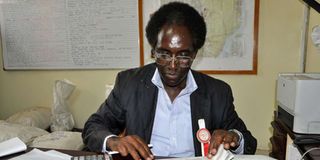How growing up poor led man to start food processing factory

ProSoya Kenya Limited founder Muguika Kaburu goes through records at his office in Nairobi.
What you need to know:
- “Looking at my surroundings, I felt that I needed to fight the poverty, unemployment and malnutrition," says Muguika Kaburu.
- From a single machine producing a few kilogrammes a day, Mr Kaburu's firm now produces up to 72 tonnes of 38 different types of products using highly sophisticated machines in a day.
- He sources raw materials for his products from other countries like Malawi, Zambia, Tanzania, Uganda, DRC and Ethiopia because the same materials are much more expensive in Kenya.
When Muguika Kaburu started his flour-based manufacturing business — ProSoya Kenya Limited — one decade ago, he had no idea that one day his firm would be the luminous centre around which innumerable destinies would revolve.
Mr Kaburu was raised in a humble home by a single mother, having lost his father during the Mau Mau freedom struggle. As a young man growing up, he says he faced the full force of poverty.
Things were so tough that at one point, despite doing very well in his Form Four examinations, he had to cut short his studies due to a lack of school fees.
It is that kind of background that inspired him to work extra hard and establish a business that would not only benefit him and his family, but also his community.
“Looking at my surroundings, I knew that I had to do something. I felt that I needed to fight the poverty, unemployment and malnutrition around,” said Mr Kaburu in an interview with Powering SMEs.
He would put in the extra work, using all his spare time and means, small though they were to develop his latent resources. Eventually, his break came when he landed a consulting job for a food production company that required him to draft a business plan which would help them secure a grant from the United States Agency for International Development (USAID).
When the company was able to secure the grant, they picked him to oversee implementation of the business plan itself.
Mr Kaburu says that even though he had no background as a food specialist, he knew at the back of his mind that this was the opportunity he was waiting for. He had to seize it.
And so he set out to work. Sure enough, he did manage to see the business plan through and turn the firm’s business around. His career in food production began gaining traction.
He got more recognition through sponsorships to attend conferences in the US, where he met experts he needed to catapult his career as a nutritionist. His most important contact, however, was a gentleman working with an international company that wanted to expand its operations into Africa.
“I met a gentleman who asked me if I could recommend two employees for their company in East Africa — a director and a sales representative. Jokingly, I recommended myself and was surprised when I got the job of sales representative,” said Mr Kaburu.
Supplies
He worked this job for some time and saved Sh325,000 which he used to buy an old animal feed machine. The first batch of production gave him about 200 kilogrammes of soya cake.
He sold two kilos to a friend, a Mr Waitheru, at Sh45 a kilo, just for sampling. “Impressed by the quality of the product, Waitheru called me and asked if I could supply him with 10 tonnes in a week. That would make me Sh450,000 weekly,” said Mr Kaburu.
“You can be sure that that made me think about going to my employer to tell him; you know what, it has been a pleasure working with you,” he added jokingly.
Over time, his product grew in popularity thanks to referrals. Soon enough, he was able to secure more financing from banks to see him transition into producing a wider range of products that include porridge flours for human consumption, fortified flours as well as animal feed products such as dairy meal, sow and weaners mash, layers mash, among others.
From a single machine producing a few kilogrammes a day, Mr Kaburu's firm now produces up to 72 tonnes of 38 different types of products using highly sophisticated machines in a day.

ProSoya Kenya Limited co-directors Lucy and Fridah Kaburu at the factory in Nairobi.
The business employs over 40 people directly, and over 4,000 people indirectly, and is looking to employ up to 5,000 people along the value chain within the next five years through a partnership with 2Scale, a non-governmental organisation.
These include the farmers from whom he sources raw materials for his products and the intermediaries who earn commissions while selling his products.
Mr Kaburu hopes the government could do more to support his efforts, as it still is not easy. He, for instance, is forced to source raw materials for his products from other countries like Malawi, Zambia, Tanzania, Uganda, DRC and Ethiopia because the same materials are much more expensive in Kenya.
He has also previously suffered at the hands of mother nature, when floods visited his premises on four different occasions, resulting in loss of property worth millions.
But that experience actually made them come out stronger as they were able to move from renting a premise to buying their own property, some 5.4 acres in Mlolongo. They are setting up their own manufacturing plant, thanks to Sh30 million financing from their bankers.
He says that he is proud of the fact that he has been able to meet his objectives of manufacturing products that are geared towards fighting poverty, malnutrition and unemployment.





